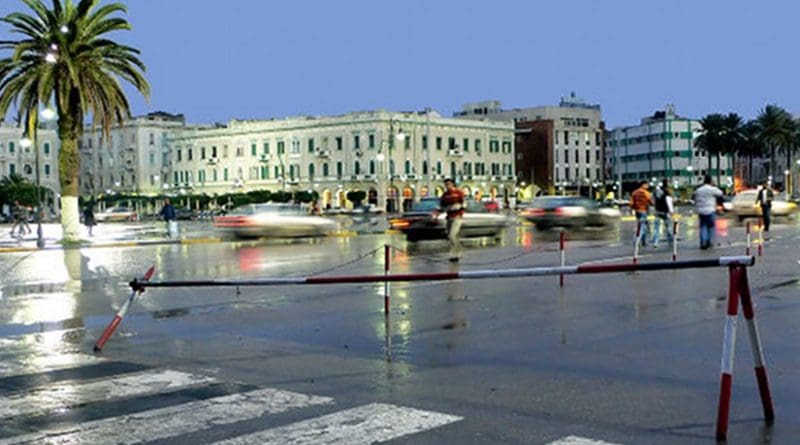Switzerland Calls For Restraint In Libya
By SwissInfo
By Julia Slater
Switzerland has called on all sides to show restraint and to do their utmost to protect the civilian population in the Libyan capital, Tripoli.
In a statement on Monday, the foreign ministry called on the regime of Moammar Gaddafi to “leave power immediately, to prevent further suffering by the civilian population”.
In addition, Swiss Foreign Minister Micheline Calmy-Rey told an ambassadors’ conference in Lucerne that she was happy about what appeared to be the approaching end of the Gaddafi regime and welcomed greater freedom and democracy for the Libyan people.
She said that Switzerland had not recognised the rebel-led National Transitional Council because it only recognises states.
However, until the election of a legitimate government, the Council remains the only partner with which Switzerland deals.
The foreign ministry statement said the Swiss embassy in Tripoli would reopen “as quickly as possible”.
Euphoria
The rebels seized control of most of Tripoli in a lightning advance on Sunday, with rebels sweeping into the heart of the city and meeting little resistance.
Crowds took to the streets to celebrate what they saw as the end of Gaddafi’s four decades in power.
Adel Shaltout, of the Libyan Mission to the United Nations in Geneva who announced in February that the entire mission was pledging allegiance to the uprising, told swissinfo.ch that friends and relatives living in Tripoli had spoken to him of their joy.
Although he admitted that no-one knew what Gaddafi might do next, he was optimistic about the future.
“The departure of Gaddafi is the first step, but the Libyan people are thinking about how to build a new state, a modern state, with the rule of law, respect for human rights,” he said.
Clashes
The whereabouts of the Libyan leader remain unknown, but three of his sons, Saif al-Islam, Saadi and Mohammed, were reported to be in rebel hands.
The International Criminal Court in The Hague, which wants Saif al-Islam along with his father on charges of crimes against humanity, confirmed that he had been held and said that he should be handed over for trial.
However, despite euphoria among rebels and their backers in Tripoli and elsewhere, Gaddafi continued to broadcast messages of resistance, and government tanks shelled parts of central Tripoli on Monday.
The Reuters news agency quoted reports on the Emirates-based al-Arabiya television network that there had been “fierce clashes” between rebels and Gaddafi loyalists about 20 kilometres from the Tunisian frontier.
Rebel spokesman Mohammed Abdel-Rahman, who is in Tripoli with rebel forces, cautioned that Gaddafi troops still posed a threat, and that as long as Gaddafi remained on the run “the danger is still there”.
Freddy Gsteiger, a correspondent for Swiss Radio DRS, added that while a rapid collapse of the regime was conceivable, further bloodshed couldn’t be ruled out.
“Even with a small group of remaining soldiers Gaddafi can still wage a war using terrorist methods. For that he doesn’t need an organised army or extensive military power,” he said.
“If Gaddafi really wants to fight until the last drop of blood, there could be many casualties.”
Gaddafi defiant
For his part Gaddafi, who seized power in a military coup in 1969, said he was opening up weapons stores to arm the population. His spokesman, Moussa Ibrahim, predicted a violent reckoning by the rebels.
“A massacre will be committed inside Tripoli if one side wins now, because the rebels have come with such hatred, such vendetta… Even if the leader leaves or steps down now, there will be a massacre.”
However, Shaltout said such talk was mere propaganda and he rejected the suggestion that Gaddafi supporters might be genuinely afraid for their future.
“The Libyan people are very tolerant. We are going to have an independent judicial system. Everyone will have a fair trial.”
“Everyone should know this is a new state, a state of tolerance, a state of mercy, a state of brotherhood and friendship. We are not going to clash with each other because at the end of the day we are all Libyans,” he said.
Three options
As for what happens next, Gsteiger said Gaddafi “basically has three options”.
“First, he could flee into exile. He could also fight to the last and die a martyr – as he has previously said he would. Or third, he is captured and tried for crimes against humanity by the International Criminal Court.”
Gsteiger didn’t think the rebels were in a position, either militarily or from an organisational point of view, to rebuild the country’s infrastructure quickly.
“It shouldn’t be forgotten that the current success is not thanks to the superior strategy or organisation of the rebels but rather to the collapse of the Gaddafi regime and armed forces – and Nato contributed significantly to that,” he said.
The chances were slim, he added, that stable or democratic conditions would be seen in Libya in the near future.
“On the other hand the international community – the United Nations, the European Union, Nato – are obviously now obliged to support the rebels, organisationally and financially, but above all with advice. The opposition leaders are really depending on that.”

